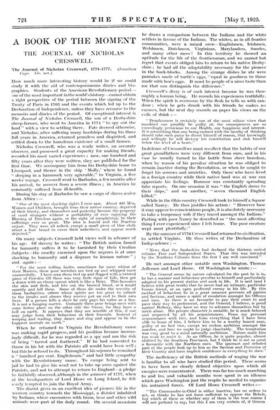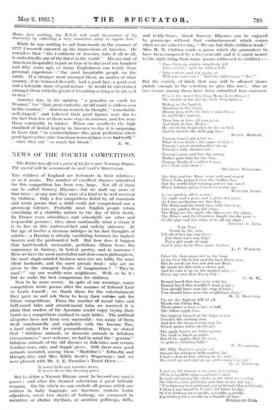A BOOK OF THE MOMENT THE JOURNAL OF NICHOLAS CRESSWELL
How much more interesting history would be if we could study it with the aid of contemporaneous diaries and bio- graphies. Students of the American Revolutionary period—
:me of the most important inthe world's history—cannot obtain a right perspective of the period between the signing of the
Treaty of Paris in 1763 and the events which led up to the Declaration of Independence, unless they have recourse to the memoirs and diaries of the period. Of exceptional interest is The Journal of Nicholas Cresswell, the son of a Derbyshire sheep-farmer, who went to America in 1774 " to spy out the land " with a view to settling there. Fate decreed otherwise, and Nicholas, after suffering many hardships during his three full years in America, returned penniless and dispirited, and settled down to the humdrum existence of a small farmer.
Nicholas Cresswell, who was a ready writer, an accurate observer, and possessed a great capacity for making friends, recorded his most varied experiences : now, one hundred and fifty years after they were written, they are published for the first time. We accompany him from his Derbyshire home to Liverpool, and thence in the ship ' Molly,' where he found " sleeping in a hammock very agreeable," to Virginia, a five weeks' voyage. Cresswell went to Barbados, a few months after his arrival, to recover from a severe illness ; in America he
constantly suffered from ill-health.
During his stay at Barbados he saw a cargo of slaves arrive from Africa :-
" One of the most shocking sights I ever saw. About 400 Men, Women and Children, brought from their native country, deprived of their liberty, and themselves and posterity become the property of cruel strangers without a probability of ever enjoying the Blessing of Freedom again, or the right of complaining, be their sufferings ever so great. The idea is horrid and the Practice unjust. They were all naked, except a. small piece of blue cloth about a foot broad to cover their nakedness, and appear much dejected."
On many subjects Cresswell held views well in advance of his age. Of slavery he writes : " The British nation famed for humanity suffers it to be tarnished by their Creolian Subjects—the cruelty exercised upon the negroes is at once shocking to humanity and a disgrace to human nature " ; and again :-
" For the most trifling faults, sometimes for mere whims of their Masters, these poor wretches are tied up and whipped most unmercifully. I have seen them tied up and flogged with a twisted piece of Cowskin till there was very little signs of Life, then get a dozen with an ebony sprout which is like a Briar. This lacerates the skin and flesh-, and lets out the bruised blood, or it would mortify and kill them. Some of them die under the severity of these barbarities, others whose spirits are too great to submit to the insults and abuses they receive put an end to their own lives. If a person kills a slave he only pays his value as a fine. It is not a hanging matter. Certainly these poor beings meet with some better place on the other side the Grave, for they have a hell on earth. It appears that they are sensible of this, if one may judge from their behaviour at their funerals. Instead of weeping and wailing, they dance and sing and appear to be the happiest mortals on earth." .
When he returned to Virginia the Revolutionary cause was making rapid progress, and his position became increas- ingly difficult, for he was regarded as a spy•and ran the risk of being " tarred and feathered. " If .he had consented to throw in his lot with the Patriots all would have been well ; but this he refused to do. Throughout his sojourn he remained a " hundred per cent. Englishman," and had little sympathy with the Revolutionary cause. To escape being sent to jail he had to give his word not to take up arms against the Patriots, and not to attempt to return to England—a pledge he faithfully observed, although in the summer of 1777, when at the headquarters of Lord Howe on Long Island, he felt
sorely tempted to join the Royal Army.
The diarist gives us an excellent idea of pioneer life in the western country towards the Mississippi, a district inhabited by Indians, where encounters with bison, bear and other wild animals were part of the daily round. On several occasions - he draws a comparison between the Indians .and the white settlers in favour of the Indians. The whites, as in all frontier communities, were a mixed crew—Englishmen, Irishmen, Welshmen, Dutchmen, Virginians, Marylanders, Swedes, and many other races ! In this territory he showed an aptitude for the life of the frontiersman, and we cannot but regret that events obliged him to return-to his native Derby- shire ; he had all the adaptability -necessary for the pioneer in the back-blocks. Among the strange dishes lie ate were pancakes made of turtle's eggs, equal in goodness to those made with hen's eggs. It must be people of a nicer taste-than me that can distinguish the difference."
Cresswell's diary is of such interest because he was thor- oughly a human being. He records his experiences truthfully. When the spirit is overcome by the flesh he tells us with can- dour when lie gets drunk with his friends he makes no
excuses, but the next' day records on paper his views on the evils of drink :-
"Drunkenness is certainly one of the most odious vices that mankind can possibly be guilty of, - the consequences are so exceedingly pernicious to our . Health, our happiness and interest. It is astonishing that any being endued with the faculty of thinking should take such pains to divest'hiiiiself of reason, that knowingly and willingly he will destroy his constitution and sink himself below the level of a brute."
In defence of Cresswellwe must recollect that the habits of our great grandfathers were very different from ours, and. in his case he usually turned to the bottle from sheer boredom, when by reason of his peculiar situation he was obliged to remain -inactive during the Revolution, or when he sought to forget his sorrows and anxieties. Only those who have lived in a foreign country while their native land was at war can appreCiate his feelings. Rumour" was constantly spreading false reports. On one occasion it was " the English drove to their ships," and on another, " seven thOusand English killed."
While in the Ohio country Cresswell took to himself a Squani called Nancy. • Ile thus justifies his action : " However base it may appear to conscientious people, it is absolutely necessary to take nteinporary wife if they travel amongst the Indiank." Parting with poor Nancy he described as" the most affecting thing I ever experienced 'Since I left home. The poor creature wept most plentifully."
By the summer of 1776 CressWell had returned to civilisation, to settled Virginia. He thus writes of the Declaration of Independence . .
" News that the Sanhedrin had declared the thirteen united colonies Free and Independent States. That this was intended by the Northern Colonies from the first I am well convinced."
He met amongst other notable men Washington, Thomas Jefferson and Lord. Howe. Of Washington he wrote :— " The General seems by nature- calculated .for -the post he is--in, ho has a manner and behaviour peculiar to himself and particularly adapted to his present station and rank in life. It is said (and I believe with great truth) that he never had an intimate, particular bosom friend, or an open professed enemy in' his life. By this method of behaviour he in a great measure prevents all. parties and factions, and raises a spirit of emulation amongst his. Officers and men. .As there is no favourite to pay their court to and pave their way to preferment, and the General,- I believe, is 'prdOf against Bribery, they have no way to advance themselves but by merit alone. His private character .is amiable, he is much beloved and respected by all his acquaintances. From my personal 'acquaintance with him, and from everything that I have been able to learn of him, I believe him to be a worthy honest man, guilty of no bad vice, except we reckon ambition- amongst the number, and here we ought to judge charitably. The temptation was very great to a mind naturally ambitious. Nature made him too weak to resist it. As an Officer, he is quite popular, almost idolized by the Southern Provinces, but I think he. is not so great a favourite with the Northern ones.. The ignorant and deluded part of the people look up to him as the Saviour and Protector of their Country and have implicit confidence in everything he does."
The inefficiency of the British methods of waging the war is familiar to all who have studied this period. There seems to have been no clearly defined objective upon which all energies were concentrated. There was far too much marching to and fro, and valuable months were spent in an idleness which gave Washington just the respite he needed to organize his untrained forces. Of Lord Howe Cresswell writes " The Commander-in-Chief is either inactive, has no orders to act, or thinks he, has not force sufficient to oppose the Rebels, but which of these or whether' any of them is the true reason I will-not pretend to say, but this I am very certain of, if Genera
Howe does nothing, the Rebels will avail themselves of his inactivity by collecting a very numerous army to oppose him."
While he was waiting to sail homewards in the summer of
• 1777 .Cresswell summed -up 'his impressions of America. He considers that " the Continent of America, take it all in all,
• is undoubtedly one of the finest in the world." His account of American hospitality is just as true of to-day as of one hundred and fifty years ago, as many Englishmen can testify from personal experience—" the most hospitable people on the earth. If a stranger went amongst them, no matter of what country, if he behaved decently, had a good face, a good coat and a tolerable share of good nature—he would be entertained amongst them with the greatest friendship as long as he pleased to stay."
America was, in his opinion, " a paradise on earth for Women," for " that great curiosity, an old maid, is seldom seen in this country." American women, lie thought, " remarkably well-shaped," and believed their good figures were due to the fact that few of them wore stays in summer, and few wore them constantly in winter. When one recollects the high standard of dental hygiene in America to-day it is surprising to learn that " to counterbalance this great perfection (their goad figures) they (the American women) have very bad teeth 7
---since they eat " so much hot bread." E. W.











































 Previous page
Previous page